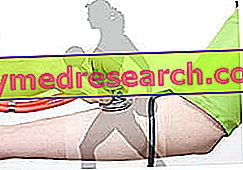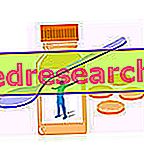Definition
The thyroid nodules are small cellular aggregates, of more or less soft consistency, located at the base of the neck, precisely at the anatomical site of this gland. Thyroid nodules are a fairly common condition among the population; fortunately, most of the time these cell clusters turn out to be simple cysts or benign adenomas, although they can sometimes develop into cancer (malignant tumor).
Causes
Thyroid nodules can be caused by thyroid diseases (eg follicular adenoma, Hashimoto's disease), cysts, goiter, cancer (cancer can be both cause and consequence). The likelihood of thyroid nodules forming increases under certain conditions: iodine deficiency, advanced age, pregnancy, genetic predisposition, radiation, female sex.
Symptoms
Nervousness and excessive sweating are often signs of a possible thyroid nodule; moreover, when the nodule has considerable dimensions, the patient, in addition to easily perceiving its presence, often complains of difficulty breathing and swallowing, pain, swollen lymph nodes in the neck, hyper / hypothyroidism, feeling of suffocation, neck tension, cough, voice hoarse.
Information on thyroid nodules - drugs for the treatment of thyroid nodules is not intended to replace the direct relationship between health professional and patient. Always consult your doctor and / or specialist before taking thyroid nodules - drugs for the treatment of thyroid nodules.
drugs
Some thyroid nodules are so small in size that they do not cause particular concern; in this case, the patient must undergo periodic medical checks (thyroid function test, physical palpation, biopsy), to avoid a possible worsening of the nodule and monitor its progression.
When the thyroid nodule hinders the simple daily activities of the subject, or in any case represents a problem for the same, the possible therapeutic options can be varied:
- Iodine supplement with diet: it is recommended to take milk, fish, seafood, and to season foods with iodized salt. You can also take iodine supplements. These simple steps can help reduce the size of the thyroid nodule.
- Taking medicines (radioactive iodine, thyroid hormones, Levotiroxia).
- Injection of ethanol: even the injection of alcohol is useful to make the nodule on the thyroid shrink.
- Laser therapy: useful for reducing the size of the benign nodule to the thyroid, facilitating the patient in breathing and swallowing.
- Surgery: surgical excision of the thyroid nodule is not only applicable to malignant forms; in fact, when the size of the nodule is such as to cause serious difficulty in swallowing and breathing, surgical excision is a particularly effective alternative. If the thyroid nodule is malignant, surgery is the preferred treatment (thyroidectomy); following the intervention, the patient must take specific drugs (eg Levothyroxine) to ensure the body has the right amount of thyroid hormones. For further information: see article on drugs for the treatment of thyroid cancer.
- Treatment for the treatment of hyperthyroidism: some thyroid nodules can cause the gland to produce abnormal and excessive amounts of hormones. In this case, the patient will have to take drugs aimed at treating hyperthyroidism: radioactive iodine, methimazole (also called tiamazole) and Potassium Perchlorate are three substances that are very widely used for this purpose. Do not forget, however, the risks and side effects derived from a similar therapy (essentially liver disorders).
We emphasize the possible drugs used in therapy for the treatment of thyroid nodules:
- Radioactive iodine (Iodine 131): the patient suffering from thyroid nodules can be treated with radioactive iodine. This drug is generally used in therapy for the treatment of thyroid cancer, as an alternative to surgery, but it can also be taken in case of thyroid nodules potentially at risk of degeneration into malignant neoplasia. Radioactive iodine is generally taken orally in the form of tablets: it is then absorbed by the intestinal tissue, passes into the blood and is finally absorbed by the thyroid. The dosage must be established by the doctor.
- Levothyroxine (eg Eutirox, Syntroxine, Tiracrin, Tirosint): the hormonal drug must be taken initially at a dose of 12.5-50 mcg per day. The dose may increase by 12.5 to 25 mcg per day every 2-4 weeks. This dosage is useful for balancing the level of thyroid hormones in the event of hypothyroidism, both in the context of a thyroid nodule, and following surgery (removal of the thyroid). The intake of L-thyroxine is not only useful for reducing the size of the thyroid nodule, but also for stopping its growth. The drug is contraindicated in case of excessive goiter, menopausal women, subjects suffering from arrhythmias, men over fifty, suspicious nodule.
- Methimazole or Tiamazole (eg Tapazole, Bromazole): the drug is an antithyroid to be used for the treatment of hyperthyroidism in the context of thyroid nodules. It can also be taken as an alternative to thyroidectomy. The drug should be taken orally at a dose varying from 15 to 60 mg a day, divided three times a day. Consult your doctor.
- Potassium perchlorate (eg Peritroid): like the previous drug, potassium perchlorate is also widely used in therapy to treat hyperthyroidism possibly associated with thyroid nodules. The drug is available in the form of 200 mg tablets: it is recommended to take 3-4 tablets per day (600-800 mg), divided into three doses each day. The first benefits of the drug are really observable after a month of treatment. However, potassium perchlorate is a second-line drug for treating thyroid nodules.



